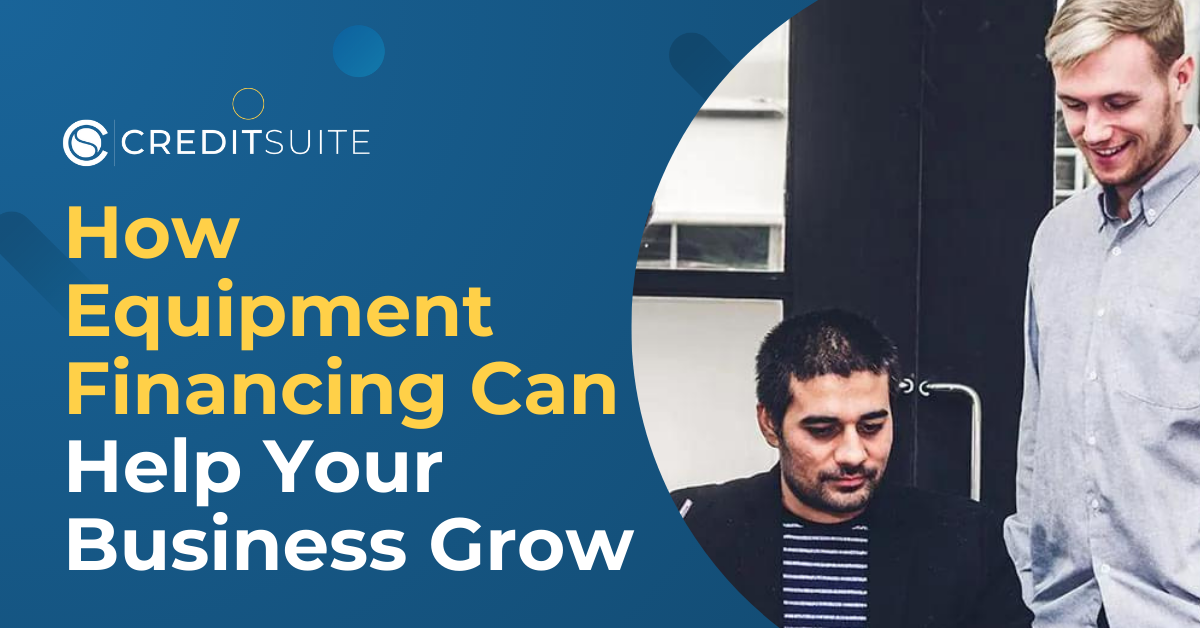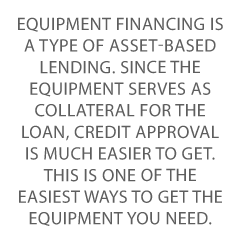Equipment financing is just one of many things on the mind of a business owner.
They have so many issues running through their minds on a daily basis. From wealth management to making online banking choices, running a business is hard.
Choosing the best financing option for a specific need is on the list as well, and it can be overwhelming. Do you need working capital, a business line, or one of the Small Business Administration options? It all depends on the specific business need.
What is Equipment Financing?
Equipment financing is a type of asset based lending. Since the equipment serves as collateral for the loan, credit approval is much easier to get. This is one of the easiest ways to get the equipment you need.
When it comes to equipment finance in terms of a lease, you can deduct the interest, and you will not need a large down payment to get approval.
This is one of the reasons over 80% of U.S. businesses use equipment lease financing to get equipment for their businesses. Most commercial banking establishments offer it as an option.
The Benefits of Equipment Financing When Purchasing Business Equipment
Using business equipment financing with a lender, you can improve your business cash flow and increase capital.
You can keep your normal cashflow, and leave your money in the bank. So, you can avoid major out of pocket expenses incurred by buying the equipment up front. And you can benefit from multiple tax advantages.
You’ll essentially be getting a secured term loan for your equipment without taking out a new personal loan. Of course, the loan amount will vary based on the business equipment you’re buying.
Equipment leasing is a common equipment financing option. When leasing machinery, you will find most leasing options offer you fixed-rate funding. This means your interest rate and monthly payment will stay the same from month to month during the term of your lease.
There are a few different options when it comes to getting financing for your equipment. If you want an SBA loan, the 7a program will work. National Funding is an option when it comes to non-traditional lenders. For automobiles, a trac lease could be an option.
One thing to keep in mind when choosing a lender, other than their customer service track record, is that finding one with an industry expertise related to the industry of your business as it can only help you.
What About Choices Other Than Equipment Financing for a Business?
Whether you need office machinery or large commercial machines used for manufacturing, equipment financing is a perfect option for you and your business.
You can also use this equipment loans if you are starting a new business which needs equipment to operate.
There is typically no down payment required on equipment leasing loans. The lender will collect 1 to 2 of your monthly payments upon approval of the loan.
This amount of money you need is usually equal to 3 to 7% of the total equipment cost.
You will have low monthly payments available with equipment loans. And the company you are using for your equipment financing can tailor your payments to fit your company’s individual needs.
You can also include taxes and other charges such as installation charges into your new equipment lease.
Company Credit versus Equipment Financing?
With better cash flow, you’ll be better able to keep up with credit payments as you pay off the loan. This means a better PAYDEX score and more.
Use Equipment Financing When Needed, But Don’t Forget to Build Corporate Credit
Small business credit is credit in a company’s name. It doesn’t connect to an owner’s consumer credit, not even when the owner is a sole proprietor and the solitary employee of the business.
This allows a business to get a company credit card and vendor credit without any impact on or from personal credit.
The Benefits
Since company credit is independent from personal, it helps to safeguard a business owner’s personal assets in case of a lawsuit or business bankruptcy.
Also, with two separate credit scores, a small business owner can get two separate cards from the same vendor. This effectively doubles purchasing power.
Another advantage is that even start-ups can do this. Going to a bank for a small business loan can be a recipe for disappointment. But building corporate credit, when done right, is a plan for success.
Your consumer credit score is dependent on payments but also various other factors like credit utilization percentages.
But for company credit, the scores truly merely hinge on if a company pays its bills punctually.
The Process
Growing company credit is a process. It does not happen without effort. A small business has to be fundable to lending institutions and merchants.
Due to this fact, a company needs a professional-looking website and email address. Get website hosting from a supplier like GoDaddy.
Also, business telephone numbers must have a listing on 411. You can do that here: http://www.listyourself.net/ListYourself/.
Additionally, the company phone number should be toll-free (800 exchange or similar).
A business also needs a bank account devoted purely to it, and it needs to have every one of the licenses essential for running.
Licenses
These licenses all must be in the perfect, correct name of the company. And they need to have the same business address and phone numbers.
So bear in mind, that this means not just state licenses, but possibly also city licenses.
Working with the IRS
Visit the Internal Revenue Service website and get an EIN for the business. They’re free. Pick a business entity like corporation, LLC, etc.
A business may get started as a sole proprietor. But they absolutely need to switch to a form of corporation or an LLC.
This is to diminish risk. And it will maximize tax benefits. It will also make it possible to build corporate credit. Without becoming a separate business entity, a business cannot establish its own credit history.
A business entity matters when it concerns taxes and liability in case of a lawsuit. A sole proprietorship means the entrepreneur is it when it comes to liability and tax obligations. Nobody else is responsible.
Instigating the Corporate Credit Reporting Process
Begin at the D&B website and get a totally free D-U-N-S number. A D-U-N-S number is how D&B gets a small business into their system to produce a PAYDEX score. If there is no D-U-N-S number, then there is no record and no PAYDEX score.
Once in D&B’s system, search Equifax and Experian’s sites for the company. You can do this at www.creditsuite.com/reports. If there is a record with them, check it for accuracy and completeness. If there are no records with them, go to the next step in the process.
By doing this, Experian and Equifax have activity to report on.
Starter Vendor Credit
First you need to establish tradelines that report. Then you’ll have an established credit profile, and you’ll get a corporate credit score.
And with an established company credit profile and score you can begin to get credit for numerous purposes, and from all sorts of places.
These sorts of accounts often tend to be for things bought all the time, like marketing materials, shipping boxes, outdoor workwear, ink and toner, and office furniture.
But to start with, what is trade credit? These trade lines are credit issuers who give you starter credit when you have none now. Terms are commonly Net 30, rather than revolving.
Therefore, if you get an approval for $1,000 in vendor credit and use all of it, you need to pay that money back in a set term, like within 30 days on a Net 30 account.
Vendor Credit – It Helps
Not every vendor can help in the same way true starter credit can. These are vendors that grant approval with marginal effort. You also need them to be reporting to one or more of the big three CRAs: Dun & Bradstreet, Equifax, and Experian.
As you get starter credit, you can also start to get more credit. Credit Suite can help you find the best starter credit options for your business.
Monitor Your Company Credit
Know what is happening with your credit. Make certain it is being reported and attend to any errors ASAP. Get in the practice of checking credit reports. Dig into the particulars, not just the scores.
A Word about Building Corporate Credit
Always use credit smartly! Don’t borrow beyond what you can pay off. Keep track of balances and deadlines for payments. Paying in a timely manner and in full does more to increase company credit scores than pretty much anything else.
Growing small business credit pays off. Good corporate credit scores help a business get loans. Your credit issuer knows the business can pay its financial obligations. They recognize the company is for real.
The small business’s EIN links to high scores and lending institutions won’t feel the need to ask for a personal guarantee for a loan
Takeaways for Equipment Financing and Company Credit
An equipment loan is a great way to fund equipment, but corporate credit is an asset which can help your small business fund itself in every way for years to come. Learn more here and get started toward establishing great corporate credit.
Equipment Financing: The Upshot
Equipment loans are the perfect financing solution for any business owner looking to purchase equipment. If that is you, then you can be in a great position to take advantage of this type of funding.



